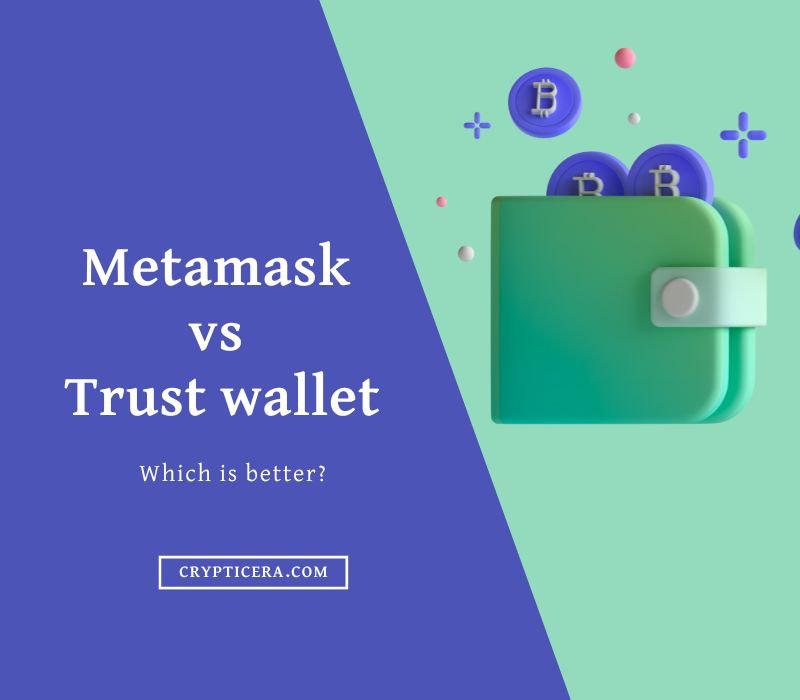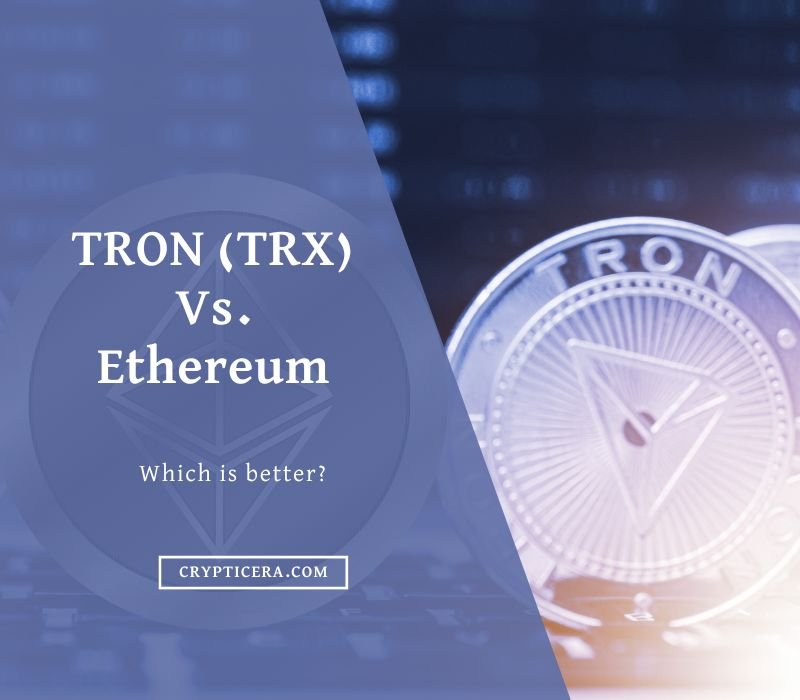Cryptocurrency digital wallets have become increasingly popular in recent years as more and more people looking to invest in and use digital currencies like Bitcoin and Ethereum.
Trust Wallet and Exodus are two popular options for storing and managing your cryptocurrency, but how do they compare?
In this blog post, we will take a closer look at the features and functionality of each wallet, as well as their pros and cons, to help you decide which one might be the best fit for your needs.
Key Takeaways:
- Exodus is a desktop and mobile wallet, while Trust Wallet is a mobile-only wallet.
- Exodus supports more than 100 cryptocurrencies, while Trust Wallet supports over 1 million assets and 53 different blockchains.
- Exodus charges fees for exchanging currencies within the wallet, while Trust Wallet offers a built-in crypto exchange with no KYC or identity verification needed.
- Both wallets offer secure local storage of private keys, with Exodus also offering the option to store keys on a hardware device.
- Trust Wallet is backed by Binance, providing a sense of trust for users, while Exodus is an independent wallet.
- Both wallets offer a DApp browser for interacting with decentralized applications, but Trust Wallet supports more DeFi protocols and NFTs.
- Exodus offers customer support through live chat, while Trust Wallet’s support has been criticized for slow response times.
We Recommend: Best Software Wallets
Choose Security over Convenience

Best 3FA Non-custodial wallet
- No seed phrase vulnerability, powered by MPC
- A guaranteed wallet recovery model
- Built-in
Web3 firewall

Best Custodial wallet (100% Solvent)
- 800+ coins and tokens
- Copy trading and bots
- Automatic Trading Strategies
- Staking APY up to 130%
Trust Wallet vs Exodus
| Feature | Trust Wallet | Exodus |
|---|---|---|
| Launched date | 2017 | 2015 |
| No. of supported currencies | 4.5M+ digital assets | 250+ assets |
| No. of blockchain supported | 50+ | 3 |
| Security measures | Two-factor authentication, password protection, recovery phrase backup | Two-factor authentication, password protection, ledger wallet support, fund recovery |
| NFT storage | Yes | Yes |
| Transaction fees | low due to BEP-20 network fees | High mainly because ERC-20 gas fees |
| DApp browser integration | Yes (DEXs, NFT Marketplaces, Staking & lending platform) | Yes (Defi and NFT Platforms) |
| Staking rewards | Yes ( high rewards for 100+ assets) | Yes (supports only 7 assets with 18% highest APY) |
| Portfolio Tracker | No | Yes |
Trust Wallet Review
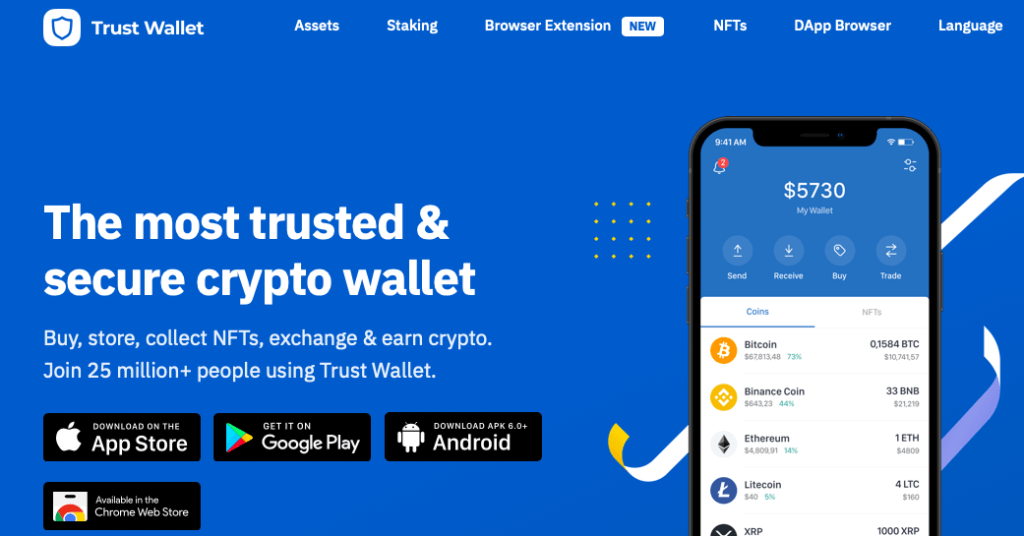
Trust Wallet is a mobile crypto wallet that allows users to store, manage, and trade cryptocurrencies.
It was created by Viktor Radchenko in 2017 and acquired by Binance in 2018.
The wallet supports more than 4 million different cryptocurrencies and tokens across multiple blockchains, including Ethereum, Binance Smart Chain, and more.
Users can buy cryptocurrencies with a credit card, bank transfer, or other payment methods within the app.
The app also provides a decentralized exchange (DEX) feature that enables users to swap cryptocurrencies without going through a centralized exchange.
Trust Wallet prioritizes security and privacy, and allows users to control their private keys, meaning they have full control over their funds.
The wallet has biometric authentication features, including Face ID and Touch ID, to protect users’ assets.
Users can also stake certain cryptocurrencies within the app and earn rewards for supporting the network.
Pros and Cons
| Pros | Cons |
|---|---|
| Easy-to-use interface | No desktop or web version |
| Supports a wide range of cryptocurrencies | No integration with hardware wallets |
| Offers a built-in DEX for trading | Some users have reported slow customer support |
| Provides strong security features, including PIN code and biometric authentication | |
| Allows users to store their private keys | |
| Supports staking for certain cryptocurrencies |
Exodus Review
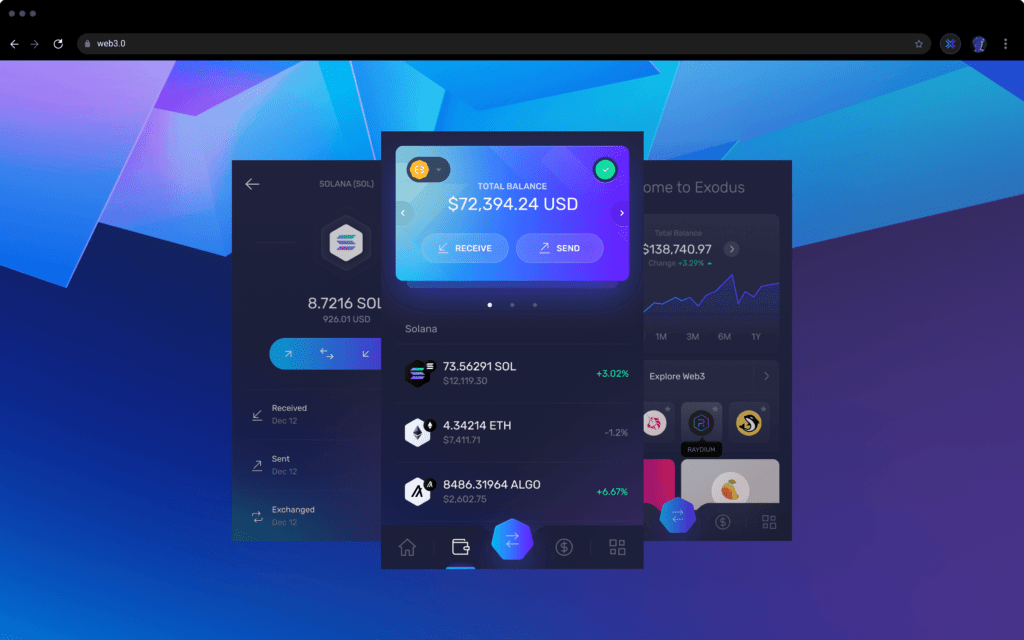
Exodus Wallet is a digital wallet that allows users to securely store, manage, and exchange cryptocurrencies.
It was created in 2015 by JP Richardson and Daniel Castagnoli, with the aim of simplifying the process of managing cryptocurrency.
Exodus Wallet supports over 100 cryptocurrencies, including Bitcoin, Ethereum, Litecoin, and many others.
The wallet uses a user-friendly interface that enables users to easily view their cryptocurrency balances, transaction history, and other important information.
Exodus Wallet also offers a built-in exchange that allows users to quickly and easily trade one cryptocurrency for another.
The wallet uses strong security measures, including encryption and backup capabilities, to keep users’ funds safe.
Exodus Wallet is available for download on Windows, Mac, and Linux, as well as on mobile devices running iOS or Android.
Pros and Cons
| Pros | Cons |
|---|---|
| User-friendly interface | Limited coins and tokens |
| Supports multiple cryptocurrencies | Not open source |
| Built-in exchange functionality | supports only 3 blockchains |
| Easy backup and recovery process | High transaction fees for some coins |
| Integrated hardware wallet support | Limited customization options |
| Customer support is available 24/7 |
Differences and Similarities between Exodus and Trust Wallet
1. Features and Supported Assets
Trust Wallet: Trust Wallet is a multi-currency wallet that supports over 1 million different cryptocurrencies and tokens. It also offers a built-in exchange feature, allowing you to easily swap between different cryptocurrencies within the app. In addition, Trust Wallet has a secure, open-source codebase and offers advanced security features such as biometric authentication and hardware device support.
Exodus: Exodus is a desktop and mobile wallet that supports over 250+ different digital assets. It also has a built-in exchange feature, allowing you to easily swap between different cryptocurrencies within the app. Unlike Trust Wallet, Exodus does not offer biometric authentication or hardware device support.
2. Usability
Trust Wallet: Trust Wallet has a user-friendly interface and is available on both iOS and Android devices. It also offers a browser extension for Chrome, Firefox, and Brave.
Exodus: Exodus is a desktop-only wallet that is available for Windows, Mac, and Linux. It also has a mobile app for iOS and Android devices.
3. Security
Trust Wallet: Trust Wallet has a secure, open-source codebase and offers advanced security features such as biometric authentication and hardware device support.
Exodus: Exodus uses a number of security measures to protect your assets, including two-factor authentication, password protection, and a secure, open-source codebase. However, it does not offer biometric authentication.
4. NFT Storage
Trust Wallet: If you’re looking for a convenient way to manage your unique ERC721 and ERC1155 non-fungible tokens (NFTs) and game assets, Trust Wallet may be a good option. This wallet allows you to easily store and access your NFTs and other crypto collectibles on the Ethereum and Binance Smart Chain blockchains.
Your collectibles are secured on the blockchain and linked to a public address, so you can have peace of mind knowing that they are safe. In recent years, It has seen a variety of crypto collectibles, such as CryptoPunks, CryptoKitties, Decentraland, Axies, and more, gain popularity. Trust Wallet makes it easy to keep all your collectibles in one place.
Exodus: Exodus supports the storage of non-fungible tokens (NFTs) on various networks and platforms. A list of the networks supported on each platform can be found in the following table.
The NFT Gallery in Exodus allows you to manage your NFT collection by enabling you to receive, send, store, and display your still-image NFTs. Although only still images can be displayed in the gallery, you can still use the wallet to send and receive other types of NFTs.
5. Staking
Trust Wallet: Trust Wallet supports a wider range of cryptocurrencies than Exodus, including Ethereum, Binance Coin, and many others. The staking rewards that you can earn with Trust Wallet will depend on the specific cryptocurrency and network you are staking, as well as the current market conditions.
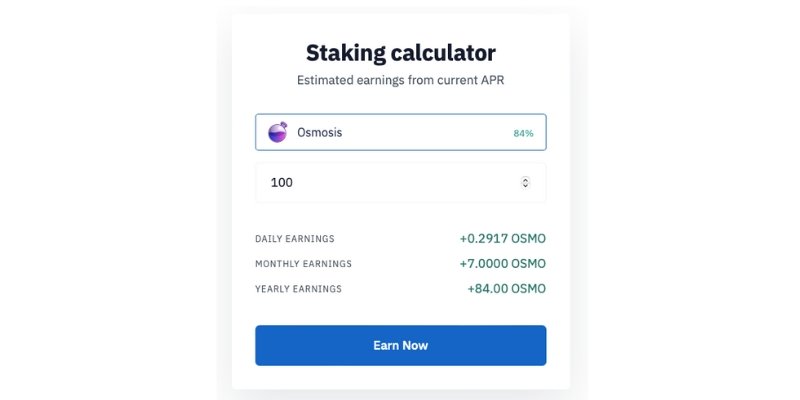
Exodus: It currently supports only 7 cryptocurrencies for staking with the highest APY of 18% on cosmos (ATOM).
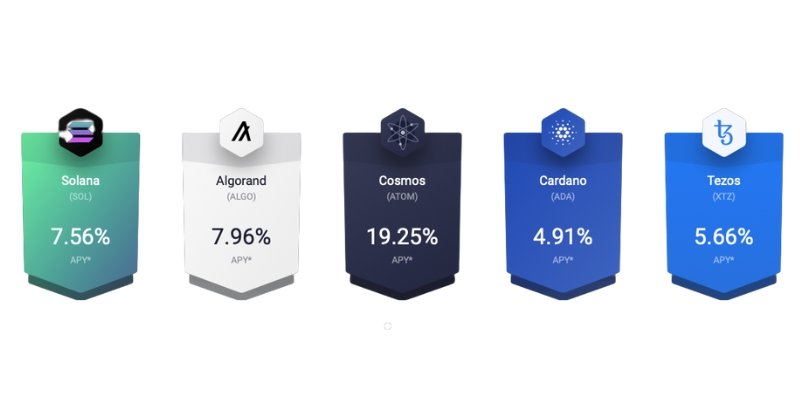
6. DApps Browser
Trust Wallet: Web3 browser is fully functional and allows you to easily interact with any decentralized application (DApp) on the Ethereum network or Binance Smart Chain. It provides a smooth, easy, and secure connection between you and any decentralized application (DApp). You can buy crypto from DEXs like Uniswap, pancakeswap, 1inch, and many others.
Exodus: Exodus is designed to be user-friendly and easy to use, with a focus on providing a seamless experience for interacting with DAPPs. It allows users to manage their cryptocurrency assets, interact with decentralized exchanges (DEXs), and perform other actions on the Ethereum blockchain.
In addition to supporting the Ethereum blockchain, Exodus also supports other blockchains such as Binance Smart Chain (BSC) and TRON. It offers a range of features, including the ability to connect to hardware wallets, view transaction history, and track asset value in real-time.
How to Setup Trust Wallet?
- Download the Trust Wallet app from the App Store or Google Play Store.
- Open the app and create a new wallet by selecting “Create a New Wallet.”
- Write down the recovery phrase and keep it safe as it can be used to recover your wallet if you lose your phone.
- Confirm the recovery phrase by selecting the words in the correct order.
- Choose a strong password and confirm it.
- Choose the coins or tokens you want to add to your wallet by selecting “Add Coin” and then searching for the coin or token you want to add.
- Transfer the desired amount of cryptocurrency to your Trust Wallet address.
- Monitor your cryptocurrency balances and transactions by opening the Trust Wallet app.
How to Setup Exodus Web 3.0 Wallet
- Visit the official Exodus website.
- Click the “Download” button to install the wallet.
- Choose your operating system and download the appropriate version of the wallet.
- Once the download is complete, open the installer and follow the installation process.
- Launch the wallet by clicking on the Exodus icon on your desktop.
- Create a new wallet by clicking on “Create a new wallet.”
- Write down the recovery phrase, which is a list of 12 words that will be used to restore your wallet if it is lost or stolen.
- Confirm the recovery phrase by entering it in the correct order.
- Set up a strong password and enter it twice to confirm.
- Exodus will generate a new wallet address for you.
- Send cryptocurrency to your Exodus wallet by copying the wallet address and pasting it into the “send” field on the exchange or wallet you are sending from.
- Track your cryptocurrency balance and transaction history within the Exodus wallet.
Conclusion
In conclusion, both Exodus and Trust Wallet offers unique features that make them appealing to different types of users.
Exodus is known for its user-friendly interface and supports over 100 cryptocurrencies. Trust Wallet, on the other hand, supports over 1 million assets and 53 different blockchains. Trust Wallet also offers an extra layer of security with biometric authentication and a PIN code.
Ultimately, the choice between these two wallets will come down to personal preferences and needs.
FAQs
Are Trust Wallet and Exodus open-source?
Yes, both Trust Wallet and Exodus are open-source projects. This means that their code is publicly available and can be reviewed and audited by anyone. This can help to increase transparency and security for users of these wallets.
Do Trust Wallet and Exodus support multiple languages?
Yes, both Trust Wallet and Exodus support multiple languages. Trust Wallet is available in more than 20 languages, including English, Spanish, French, and Chinese, while Exodus supports a slightly smaller range of languages, including English, Spanish, and French.
Do Trust Wallet and Exodus charge any fees?
Both Trust Wallet and Exodus charge fees for certain services. Trust Wallet charges a small fee for coin exchanges and other transactions, while Exodus charges a trading fee for using its built-in exchange feature.
Can I store non-cryptocurrency assets in Trust Wallet or Exodus?
No, Trust Wallet and Exodus are specifically designed for storing and managing cryptocurrency assets. They do not support the storage of non-cryptocurrency assets like stocks, bonds, or fiat currency.
Can I use Trust Wallet or Exodus on my desktop or do I need a mobile device?
Both Trust Wallet and Exodus are available for both mobile and desktop devices. Trust Wallet is available for iOS, Android, and desktop devices, while Exodus is available for Windows, Mac, and Linux.


